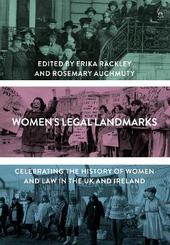
|
Women's Legal Landmarks: Celebrating the history of women and law in the UK and Ireland
Hardback
Main Details
| Title |
Women's Legal Landmarks: Celebrating the history of women and law in the UK and Ireland
|
| Authors and Contributors |
Edited by Erika Rackley
|
|
Edited by Professor Rosemary Auchmuty
|
| Physical Properties |
| Format:Hardback | | Pages:704 | | Dimensions(mm): Height 244,Width 169 |
|
| ISBN/Barcode |
9781782259770
|
| Classifications | Dewey:340.082 |
|---|
| Audience | | Professional & Vocational | |
|---|
|
Publishing Details |
| Publisher |
Bloomsbury Publishing PLC
|
| Imprint |
Hart Publishing
|
| Publication Date |
27 December 2018 |
| Publication Country |
United Kingdom
|
Description
Women's Legal Landmarks commemorates the centenary of women's admission in 1919 to the legal profession in the UK and Ireland by identifying key legal landmarks in women's legal history. Over 80 authors write about landmarks that represent a significant achievement or turning point in women's engagement with law and law reform. The landmarks cover a wide range of topics, including matrimonial property, the right to vote, prostitution, surrogacy and assisted reproduction, rape, domestic violence, FGM, equal pay, abortion, image-based sexual abuse, and the ordination of women bishops, as well as the life stories of women who were the first to undertake key legal roles and positions. Together the landmarks offer a scholarly intervention in the recovery of women's lost history and in the development of methodology of feminist legal history as well as a demonstration of women's agency and activism in the achievement of law reform and justice.
Author Biography
Erika Rackley is a Professor of Law at the University of Kent. Rosemary Auchmuty is a Professor of Law at the University of Reading.
ReviewsThe scale of this undertaking is truly remarkable and the editors are to be credited for making a success of such an ambitious project ... Although these landmarks are all particular to their own time and place, they speak clearly to contemporary problems with and within law ... They show how ruling on, arguing with, and thinking about law, all need to be transformed if meaningful change is to occur, but so too does the very framework within which these activities take place. This excellent contribution to legal scholarship will provide readers of all kinds with the intellectual tools, and impetus for action, that are necessary to engage in these difficult but vital tasks. -- Chloe Kennedy, University of Edinburgh * Edinburgh Law Review *
|